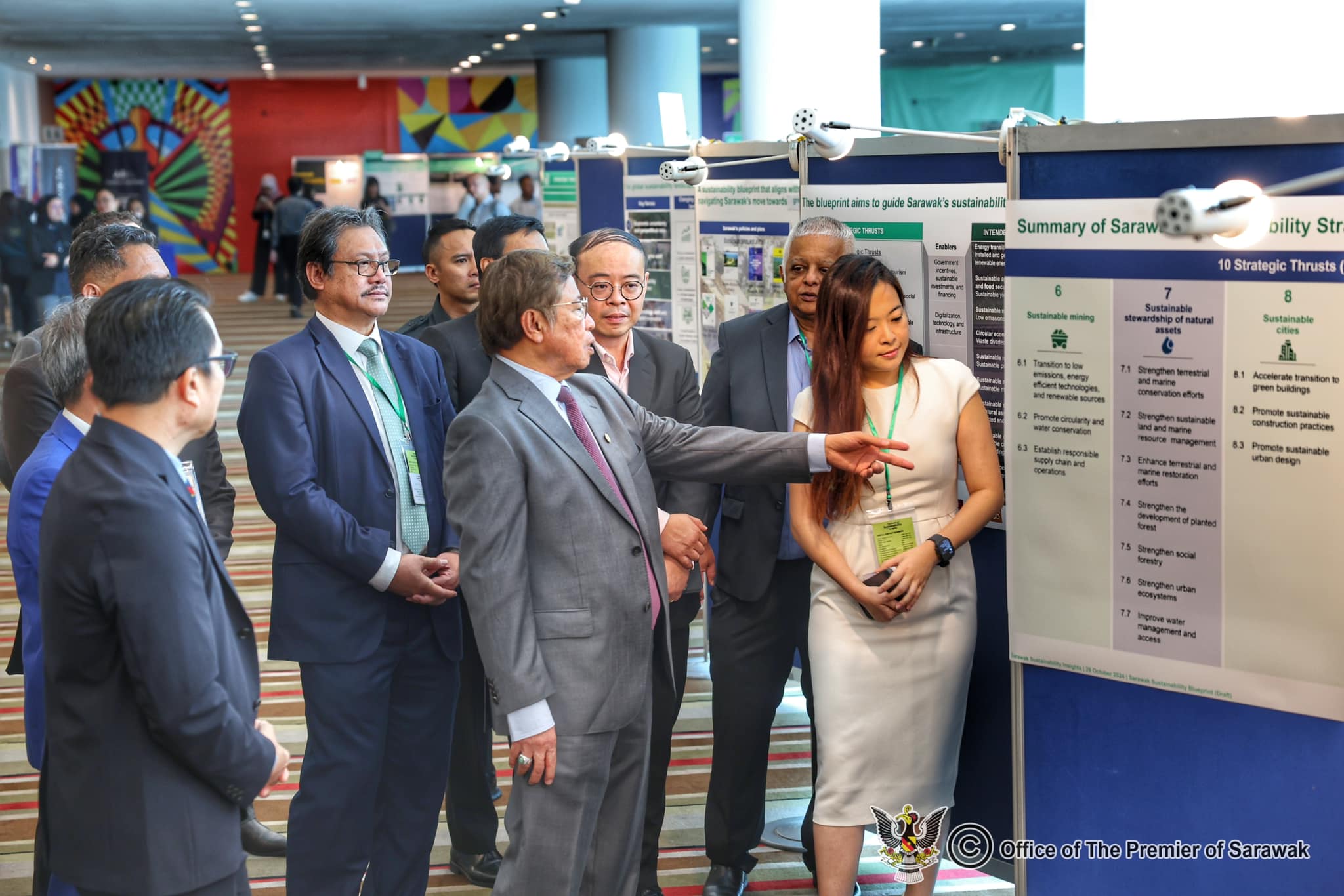OKTOBER 2024
Sarawak Sets Sights On Sustainability Leadership With Sarawak Sustainability Blueprint

KUCHING, 29 Oct — Premier of Sarawak, Datuk Patinggi Tan Sri (Dr.) Abang Haji Abdul Rahman Zohari Tun Datuk Abang Haji Openg, outlined Sarawak’s bold new vision for a sustainable future, aiming to position Sarawak as a leader in Malaysia and beyond.
Premier Abang Johari shared his commitment to balancing economic growth with environmental preservation and social inclusivity, marking these goals as central to the Post Covid-19 Development Strategy (PCDS). “As we embark on this journey, it is important to recognize that Sarawak is not just participating in the global sustainability movement; we are setting our sights on becoming a leader in Malaysia and beyond,” he said. “I am driven by a bold vision – to harmonize economic growth with environmental stewardship and uphold social equity for all citizens.”
Introducing the Sarawak Sustainability Blueprint, the Premier emphasized its role as a foundational guide across all sectors. “It is crucial for us to adopt an integrated approach that not only addresses current challenges but also positions us to meet future demands related to climate change and the circular economy,” he stated in his keynote address, at the Sarawak Sustainability Insights (SSI) 2024 event held at Pullman Hotel, Kuching,
The blueprint focuses on two main pillars—Green Transition and Economic Equity—incorporating global best practices to create a cohesive framework for sustainability. Highlighting these goals, Abang Johari announced 10 Strategic Thrusts, each aligning with the United Nations Sustainable Development Goals (SDGs).
Each of the 10 thrusts, he explained, will serve as a “foundation for sustainable development efforts,” ensuring progress across sectors.
In energy transition, the Premier emphasized Sarawak’s dedication to harnessing clean energy sources to meet domestic demand and for power export, which he described as vital for reducing the carbon footprint. “By enhancing energy efficiency, we can ‘free up’ power without building new power plants, saving significant public funds,” he said.
On sustainable agriculture and food security, Sarawak will develop agroparks to support precision farming and fishery hubs. “We aim to enhance food security while safeguarding our natural resources,” he noted.
Highlighting green mobility, Abang Johari discussed the Kuching Urban Transport System and hydrogen buses as part of Sarawak’s push to reduce emissions and improve regional connectivity.
With the circular economy, he underscored the benefits of minimizing waste and maximizing resource efficiency at household and industrial levels, embracing principles that enable sustainable consumption across all sectors.
The Premier also highlighted Sarawak’s commitment to sustainable manufacturing, promoting industry practices that reduce environmental impact and strengthen the state’s position as a regional leader.
In discussing sustainable and responsible mining, he acknowledged the economic role of mining, stressing the need for a balanced approach that considers both growth and environmental protection.
Further, the Premier emphasized the protection and enhancement of natural assets, reinforcing Sarawak’s commitment to preserving biodiversity by implementing measures to safeguard forests, rivers, and wildlife.
On sustainable cities, urban development initiatives will prioritize green spaces, renewable energy, and smart mobility to ensure growth aligns with sustainability goals.
Community development is central to Sarawak’s strategy, with Abang Johari affirming, “We will support communities through programs aimed at improving their quality of life, ensuring that no one is left behind.”
Lastly, eco-tourism initiatives will promote eco-friendly tourism, showcasing Sarawak’s natural beauty while supporting local economies and preserving cultural heritage.
The Premier stressed that sustainable progress requires collective participation. “Sustainable development cannot occur in isolation; it requires the active participation of all stakeholders—government agencies, private sector partners, civil society organizations, and, most importantly, local communities,” he said.
Abang Johari reaffirmed Sarawak’s commitment to supporting Malaysia’s national carbon emissions reduction target of 45% by 2030 through green energy development and investments in technologies like carbon capture. “This blueprint is not a static document; it is a living framework that will evolve as we learn from our experiences and successes,” he concluded.
The blueprint sets Sarawak on an ambitious path, underscoring the state’s drive to become a sustainability leader with a holistic, inclusive, and forward-looking approach.